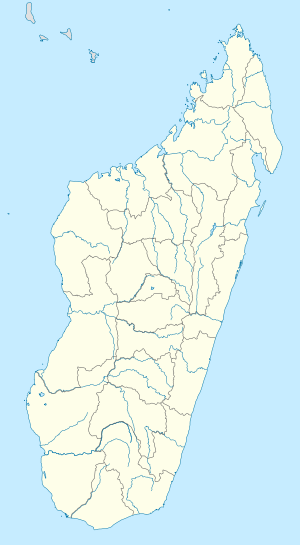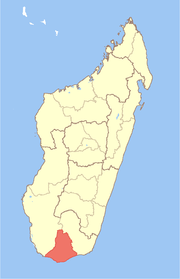Ifotaka
Ifotaka is a town and commune in Madagascar. It belongs to the district of Amboasary Sud, which is a part of Anosy Region. The population of the commune was estimated to be approximately 18,000 in 2001 commune census.[2]
Ifotaka | |
|---|---|
 Ifotaka Location in Madagascar | |
| Coordinates: 24°48′S 46°8′E | |
| Country | |
| Region | Anosy |
| District | Amboasary Sud |
| Elevation | 72 m (236 ft) |
| Population (2001)[2] | |
| • Total | 18,000 |
| Time zone | UTC3 (EAT) |
| Climate | BSh |
Primary and junior level secondary education are available in town. The majority 50% of the population of the commune are farmers, while an additional 40% receives their livelihood from raising livestock. The most important crop is cassava, while other important products are maize and sweet potatoes. Industry and services provide both employment for 5% of the population.[2]
References and notes
- Estimated based on DEM data from Shuttle Radar Topography Mission
- "ILO census data". Cornell University. 2002. Retrieved 2008-05-04.
gollark: Oh, did I not get a *sharp* rock?
gollark: What?
gollark: ++roll d2
gollark: 1d2? Bee.
gollark: I hit the GM#1 with my rock.
This article is issued from Wikipedia. The text is licensed under Creative Commons - Attribution - Sharealike. Additional terms may apply for the media files.
